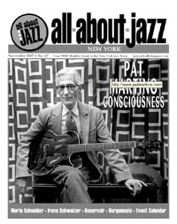Literary allusions from musicians are always intriguing and lead to speculation about their motives. Although Samuel Beckett and James Joyce are perennial musicians' favorites, Albert Camus is less often cited... although The Cure's "Killing an Arab" lives long in the memory. If the group name Mersault could be taken as a reference to Camus, then the title of this album leaves no doubt, as it references two key characters from L'Etranger (1942). So, what conclusions should we draw from that? Should we expect the music to display nihilism devoid of emotion, and unsettling detachment... or would that be taking things too far? Well, whether or not they are based on Camus, each piece here is definitely structured with a well-honed sense of drama.
Right from the start of the long (thirty minute) opening track, it is obvious that the music is not devoid of emotion, far from it; Christian Weber's bowed bass has an engaging woodiness—humanness—to it, and it is the bass that underpins Raymond & Marie, throughout acting as the heartbeat of the music, its soul. Weber, guitarist Tomas Korber and drummer Christian Wolfarth set up a slowly evolving drone piece that effectively offsets that
Right from the start of the long (thirty minute) opening track, it is obvious that the music is not devoid of emotion, far from it; Christian Weber's bowed bass has an engaging woodiness—humanness—to it, and it is the bass that underpins Raymond & Marie, throughout acting as the heartbeat of the music, its soul. Weber, guitarist Tomas Korber and drummer Christian Wolfarth set up a slowly evolving drone piece that effectively offsets that
bass against high frequency electronics, without much in the mid-frequency range. Wolfarth's drumming ensures a constant pulse even when he is laying down a complex polyrhythm. Just as the drone seems to be reaching a steady state, the trio springs a surprise, paring the sound right back to the merest hint of a bass throb before slowly building up again. A satisfying piece.
The opening of the second track is dominated by Wolfarth, as the threesome establishes a piece laden with tension that threatens to explode into life at any moment. It never does explode, but there is immense pleasure to be had in that tension. The drone that closes the piece—with another bass pulse at its heart—is necessary to provide a period of relative calm. Again, lovely.
The final track, the shortest at nine minutes, opens with quiet static hiss, joined shortly by arco bass and a screeching resonant tone that ebbs and flows throughout, building to a climactic howl of noise that brings the album to a suitably dramatic end. Overall, very impressive.
John Eyles
The opening of the second track is dominated by Wolfarth, as the threesome establishes a piece laden with tension that threatens to explode into life at any moment. It never does explode, but there is immense pleasure to be had in that tension. The drone that closes the piece—with another bass pulse at its heart—is necessary to provide a period of relative calm. Again, lovely.
The final track, the shortest at nine minutes, opens with quiet static hiss, joined shortly by arco bass and a screeching resonant tone that ebbs and flows throughout, building to a climactic howl of noise that brings the album to a suitably dramatic end. Overall, very impressive.
John Eyles
 |
| All About Jazz (NY) #67 |
| November 2007 |